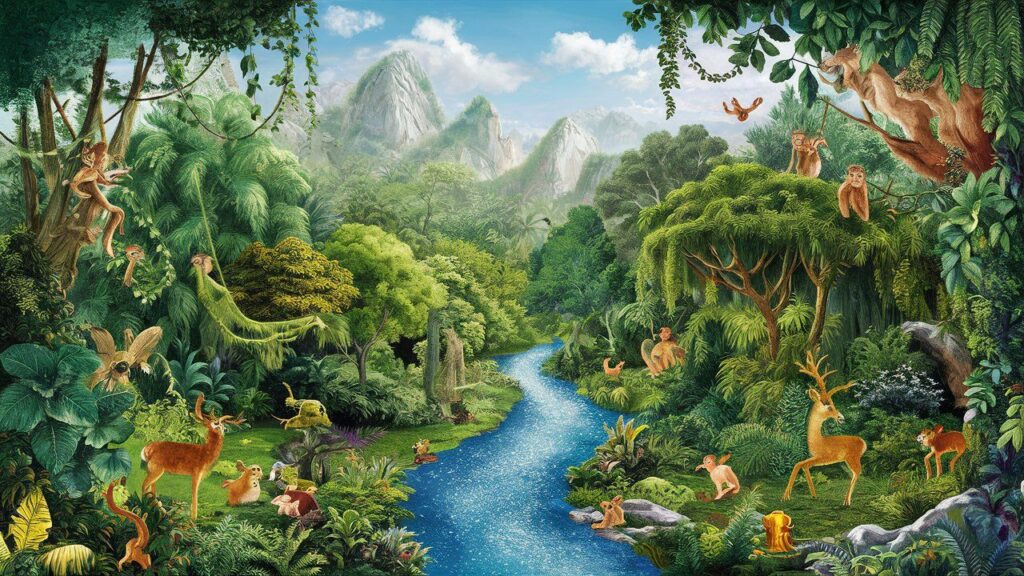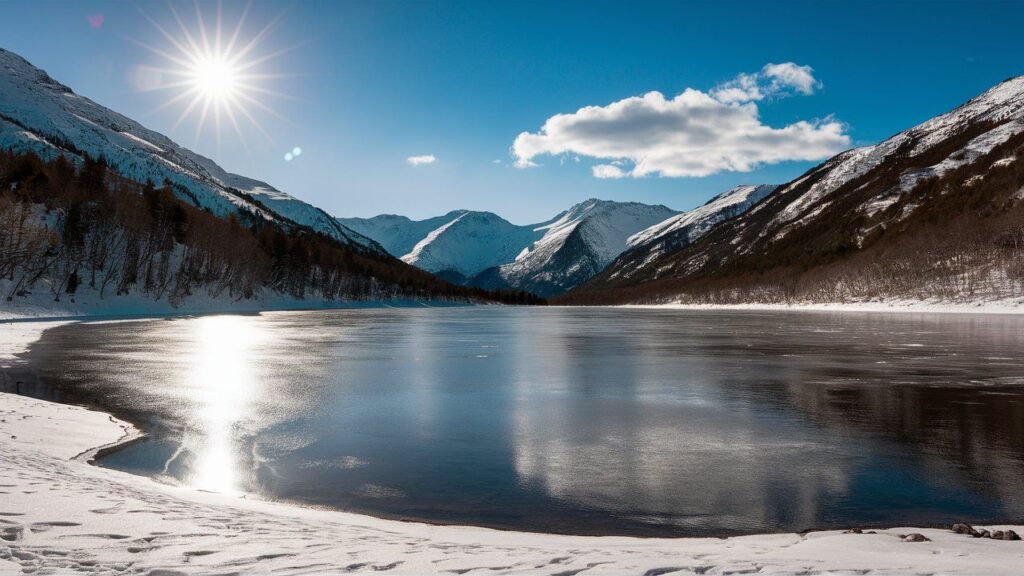
Create an image showcasing a lush forest with various wildlife living in harmony. The animals should include predators and prey, but all should be thriving due to the balance of the ecosystem. The colors should be vibrant and show the interconnectedness of all living beings in nature.
Start an exciting journey into the world of ecology. It’s the study of how living things and their surroundings interact. By understanding ecology, we learn how nature keeps everything in balance. This balance is key to keeping our planet healthy.
We will explore ecosystems and the importance of biodiversity. Biodiversity keeps nature’s balance. We’ll also look into ecological cycles, like the carbon and water cycles, which are vital for life.
As we move through different habitats, we’ll see why saving endangered species is crucial. Join us to learn about ecology and how everything in our world is connected. This connection is what keeps our planet’s ecosystem vibrant and alive.
Key Takeaways
- Ecology is the scientific study of the relationships between organisms and their environment.
- Understanding the concept of biodiversity is crucial for maintaining the natural balance of ecosystems.
- Ecological cycles, such as the carbon cycle and water cycle, play a vital role in sustaining life on Earth.
- Conservation efforts are essential for protecting endangered species and preserving the fragile balance of our natural world.
- Exploring the wonders of ecology can deepen our appreciation for the intricate connections within our environment.
Exploring the Fascinating World of Ecology
Ecology is a field that looks at how living things and their environment work together. It’s the study of how all life forms depend on each other and their surroundings. This science shows us the balance that keeps our planet healthy.
What is Ecology and Why Does It Matter?
Ecology is all about studying how living things and their environments are connected. It looks at how species interact, adapt, and help keep their ecosystems healthy. Knowing about ecology helps us keep our natural world in balance and supports all life on Earth.
The Intricate Web of Life on Earth
Our planet’s ecosystems are like a complex tapestry, with each living thing playing a part. These elements are connected, forming a web of interdependence. If one part gets hurt, it can affect the whole system. Scientists who study ecology try to understand these connections to keep life on Earth going.
| Key Ecological Concepts | Importance |
|---|---|
| Interdependence | The understanding that all living organisms rely on each other and their environment for survival. |
| Ecosystem | A community of living organisms and their physical environment, functioning as a unified whole. |
| Biodiversity | The variety of living species and their genetic diversity within an ecosystem. |
“Ecology is the science of the interconnections in nature.” – Aldo Leopold
Biodiversity: Nature’s Treasure Trove
Our planet is filled with a wide variety of life, each species crucial to the balance of nature. This variety, known as biodiversity, includes everything from tiny microbes to the largest animals. It’s the mix of life forms that make our world rich and diverse.
Biodiversity has three main parts: species diversity, ecosystem diversity, and genetic diversity. Species diversity counts the number and types of species. Ecosystem diversity looks at the different habitats, like rainforests and grasslands, each full of unique life.
At the core of biodiversity is genetic diversity. This is the variety of genes within and between species. It helps them adapt and survive in changing environments. This diversity is key to the health of our ecosystems.
“Biodiversity is the foundation of ecosystem services to which human well-being is intimately linked.” – Intergovernmental Science-Policy Platform on Biodiversity and Ecosystem Services
However, biodiversity faces threats from habitat destruction, climate change, and overexploitation. As our population grows, we must protect nature with conservation efforts. This is crucial for the future of our planet.
By valuing and understanding life’s diversity, we can work to protect it for future generations. Embracing biodiversity helps keep our ecosystems healthy and resilient. This is essential for our well-being.
Ecological Cycles: The Rhythms of Life
At the core of life on Earth, ecological cycles keep our environment in balance. These cycles, like the carbon and water cycles, are key to our planet’s harmony. They are the heartbeats that sustain life.
The Carbon Cycle: Earth’s Breathing Pattern
The carbon cycle is vital for the movement and change of carbon in ecosystems. It moves carbon between the atmosphere, oceans, and land, supporting life’s growth and decay. Knowing the carbon cycle helps us understand our planet’s environmental processes.
The Water Cycle: Nature’s Circulatory System
The water cycle, or hydrologic cycle, moves water through Earth’s surface, air, and underground. It’s key for life, as it distributes and stores water. From evaporation to rainfall, it’s vital for our ecosystems.
| Ecological Cycle | Key Components | Importance |
|---|---|---|
| Carbon Cycle | Photosynthesis, respiration, decomposition, fossil fuel combustion | Regulates atmospheric CO2 levels, supports plant growth, and drives global climate patterns |
| Water Cycle | Evaporation, transpiration, precipitation, groundwater flow | Distributes and replenishes freshwater resources, maintains the balance of aquatic ecosystems, and influences regional climates |
These cycles, along with others, make up life on Earth. They connect our natural world’s diverse parts. By understanding these cycles, we see how vital they are for our planet and our role in protecting it.
Ecosystems: Nature’s Intricate Tapestry
Explore the world of ecosystems, the key parts of our natural world. These are living communities and their surroundings. They are the heart of our planet. Let’s look at the different types, like forest ecosystems and biomes, each important for life.
Forests: Lungs of the Planet
Forests are amazing ecosystems on Earth, often called the “lungs of the planet.” They are not just beautiful but also crucial for our planet. They take in a lot of carbon dioxide, helping to keep our air clean.
Forests are vital for life, full of biodiversity. They help with the water cycle and carbon cycle. This makes them essential for our planet’s health.
“Forests are the lungs of our land, purifying the air and giving fresh strength to our people.” – Franklin D. Roosevelt
Forests cover many areas, from cool temperate zones to hot tropics. Each one is unique, full of plants and animals. They help control the climate, stop soil from washing away, and support many communities.
Learning about ecosystems shows us how crucial forests are. They are key to keeping life on Earth balanced.
The Delicate Balance of Ecology
In the intricate web of life, the concept of ecological balance is key. This balance is kept by the complex relationships and feedback loops in ecosystems. Ecological balance means how different environmental factors like climate, resources, and natural events work together. They keep the biodiversity and overall ecosystem stability in check.
The heart of balance is the role of biodiversity. Many species, from tiny microbes to big trees, work together to keep their home balanced. Each one plays a special part, making the ecosystem strong and able to change with the environment.
“The health and stability of an ecosystem are directly proportional to its biodiversity. When we disrupt this balance, the consequences can be dire and far-reaching.”
But, this balance is very fragile. Human actions like destroying habitats, polluting, and changing the climate can harm it. This leads to losing species and harming natural places. Ecosystem stability is key for the important services ecosystems give us, like controlling the climate and cleaning our air and water.
Keeping the ecological balance is vital for our planet’s future. By understanding life’s complex web and the need for nature’s balance, we can act to protect and care for the ecosystems that support us.
Ecology and Climate Change

Create an image that showcases the impact of climate change on nature’s delicate balance. Depict a world where weather patterns have become unpredictable, and ecosystems are struggling to adapt. Show how rising temperatures have led to melting ice caps, rising sea levels, and the destruction of habitats. Highlight the loss of biodiversity, with species disappearing at an alarming rate. Use color and contrast to make the image look dramatic and impactful, while still being beautiful in a naturalistic way.
Our world faces a big challenge with climate change. The link between human actions and nature’s balance is key. This balance is crucial for our planet.
The Impact of Human Activities
Human actions like burning fossil fuels and cutting down trees have hurt the environment a lot. These actions mess with nature’s cycles, causing big problems. This has led to rising temperatures, melting ice, and losing species, which can upset our planet’s balance.
Strategies for Mitigating Climate Change
- Using renewable energy like solar, wind, and water to lessen our fossil fuel use.
- Choosing farming ways that are good for the earth.
- Working to save and fix natural places to keep ecosystems healthy.
- Getting people and groups to live more eco-friendly by cutting waste, recycling, and saving energy.
We need to fix the causes of climate change and protect nature to have a better future. As the ones taking care of the planet, it’s our job to protect nature and help it survive these tough times.
| Metric | Current Impact | Projected Impact |
|---|---|---|
| Global Temperature Rise | 1.1°C (2.0°F) above pre-industrial levels | 1.5°C (2.7°F) to 2.0°C (3.6°F) by 2050 |
| Sea Level Rise | 20 cm (7.9 inches) since 1900 | 30 cm (11.8 inches) to 60 cm (23.6 inches) by 2100 |
| Extreme Weather Events | Increased frequency and intensity | Continued increase in frequency and intensity |
“The future of our planet depends on our ability to embrace sustainable practices and protect the delicate balance of our ecological systems.”
Understanding how our actions affect the environment and taking steps to fight climate change can lead to a better future. This way, we can keep the beauty of nature for future generations.
Ecology and Sustainability
Our world faces big challenges like environmental damage and climate change. The study of ecology is key to solving these problems. It guides us in making choices that protect the planet. The ecological footprint shows how our actions affect nature.
Sustainable development means growing the economy without harming the environment. Resource management is crucial for this. It’s about using resources wisely and making sure they can be replaced. The green economy shows how businesses and governments can work together for a better future.
Every person can help make a difference in sustainability and sustainable development. By choosing eco-friendly options and supporting green policies, we can all help reduce our ecological footprint. This helps protect our planet for the future.
| Sustainability Metric | National Average | Global Average |
|---|---|---|
| Ecological Footprint (global hectares per capita) | 8.1 | 2.8 |
| Renewable Energy Consumption (%) | 11.6 | 17.1 |
| Sustainable Development Index (0-100 scale) | 78.9 | 71.5 |
By following ecology and sustainability, we can create a future where growth and nature care work together. This ensures our planet stays healthy and vibrant for a long time.
“Sustainability is not about losing our homes, it’s about finding new ones that are better suited to the way we live now.” – Sarah Susanka
The Importance of Conservation Efforts
Today, protecting our planet’s natural resources is more important than ever. We face big challenges in conservation. Saving endangered species, protecting habitats, and keeping ecosystems safe is crucial. We all need to take action to be good stewards of the environment.
Protecting Endangered Species
Many species are at risk of disappearing due to habitat loss, poaching, and climate change. Conservation efforts are key to saving these animals. By stopping poaching, fixing habitats, and breeding animals in captivity, we can help them survive.
Preserving Habitats and Ecosystems
Keeping habitats and ecosystems safe is just as important. These places support life on Earth, from rainforests to coral reefs. We must protect them with strong conservation plans. This way, our planet stays healthy and balanced.
Understanding the value of conservation helps us work towards a better future. By acting together, we can save the amazing diversity of life on Earth. Let’s join hands to protect our incredible planet.
Ecology in Our Daily Lives

Create an image of a person composting in their backyard, surrounded by blooming flowers and vegetables. Show a worm bin and a compost pile in the background, and birds and insects flying around the garden. The person should be wearing gardening gloves and holding a small shovel, with a smile on their face. Make sure to emphasize the vibrant colors of the flowers and vegetables, and the lush greenery of the garden.
In our fast-paced world, it’s easy to overlook how our daily choices affect the environment. By living by ecology in everyday life, we can help protect our planet. We can all make a big difference by being more aware of our actions.
Simple actions like recycling, saving energy, and water can make a big impact. When we choose wisely what we buy and use, we lessen our harm to the planet. This way, we can all help make a better world.
- Opt for reusable shopping bags and water bottles to minimize plastic waste.
- Turn off lights and electronics when not in use to conserve energy.
- Reduce food waste by planning meals, using leftovers, and composting food scraps.
- Support local, sustainable businesses and purchase products with eco-friendly certifications.
Small actions add up to big changes. When we care more about the environment, we become guardians of our planet. This helps keep our ecosystems healthy for the future.
“Never doubt that a small group of thoughtful, committed citizens can change the world; indeed, it’s the only thing that ever has.” – Margaret Mead
By living with ecology in everyday life, we can all work towards a better future. Each step we take helps us appreciate nature more and encourages us to protect it. Let’s join together to make a positive change for our planet and its future generations.
The Future of Ecology
The future of ecology is full of both hope and challenges. Our world faces many environmental problems, like climate change and losing biodiversity. But, new solutions are coming thanks to tech and science.
Climate change is a big worry for ecology’s future. Rising temperatures and extreme weather threaten our ecosystems. Yet, renewable energy like solar and wind power gives us hope. These green technologies help reduce harmful emissions and lead to a greener future.
Dealing with biodiversity loss is also key to ecology’s future. New methods like precision farming and restoring habitats could change how we live with nature. By using science, we can protect our planet’s diverse life.
Every person’s actions will shape the future. Knowing about ecology and making eco-friendly choices helps us all. Together, we can build a world where nature and humans live in balance.
“The future of ecology lies in our ability to balance the needs of humanity with the delicate balance of the natural world. By harnessing the power of innovation and the determination of the human spirit, we can create a more sustainable future for all.” – Dr. Emily Greenfield, renowned ecologist
Ecology: Unlocking Nature’s Secrets
The world of ecology is full of exciting discoveries and new insights. These findings help us understand the natural world better. By using research and new methods, scientists are learning about the balance of life on Earth. They show how everything in nature is connected.
Ecologists are exploring from the ocean depths to the tops of ancient forests. They’re solving ecological mysteries we couldn’t figure out before. With new tech like remote sensing and data analysis, they’re studying the natural world closely. This helps us understand how everything interacts.
As ecology research grows, scientists are making big scientific discoveries. These discoveries change how we see the natural systems that support life. They help us learn about how nutrients cycle and the secrets of places with lots of different species. Ecologists are key to unlocking the potential of the natural world.
| Ecological Breakthrough | Impact |
|---|---|
| Monitoring Deforestation with Satellite Imagery | Enables real-time tracking of forest loss, informing conservation efforts |
| Microbiome Studies in Soil and Aquatic Ecosystems | Reveals the crucial role of microbial communities in ecosystem function |
| Predictive Modeling of Species Responses to Climate Change | Helps guide adaptation strategies and protect vulnerable species |
As we learn more about nature, ecology gives us hope for a better future. It shows us how to live in harmony with our planet’s ecosystems. Through ongoing ecological research and scientific discoveries, we can find ways to make our future sustainable and strong.
Conclusion
As we end our exploration of ecology, it’s clear this field is vital. Our planet’s life web is amazing, a balance we must protect. By learning from ecology, we can help nature and create a sustainable future.
This article showed us ecology’s key role in keeping ecosystems healthy. Nature’s diversity and cycles are crucial for our planet’s balance. We must act in our daily lives to lessen our impact and support sustainability.
Looking ahead, we know what we must do. We need to understand ecology better, support conservation, and value nature more. By getting people involved, we can make a better future for all. It’s time to act for our planet and the future generations.
FAQ
What is ecology and why is it important?
Ecology studies how living things and their environment interact. It’s key to understanding how nature stays in balance. It also shows how different life forms help keep our planet healthy.
What are the different types of biodiversity?
There are three main types of biodiversity: species, ecosystem, and genetic diversity. Each type is crucial for keeping ecosystems stable and resilient.
How do ecological cycles, such as the carbon cycle and the water cycle, contribute to the balance of ecosystems?
Cycles like the carbon and water cycles help control the climate and support life. They move nutrients around the environment. These cycles are key to keeping our planet healthy.
What is the impact of human activities on climate change and the delicate balance of ecology?
Human actions, like burning fossil fuels and cutting down trees, cause climate change. This harms the balance in nature. It affects ecosystems, biodiversity, and our planet’s health.
How can individuals contribute to sustainability and environmental conservation efforts?
People can help by living more eco-friendly. This means reducing waste, saving energy and water, and choosing sustainable products. It’s important to spread awareness and take personal action for the planet.
What are the emerging challenges and opportunities in the field of ecology?
Ecology faces challenges like climate change and overpopulation. But, there are also new technologies and discoveries that can help. These can make our planet more sustainable for the future.

Pingback: Absorption
Pingback: Aerobic Ecology: Understanding Life with Oxygen
Pingback: Understanding Absolute Magnitude in Astronomy